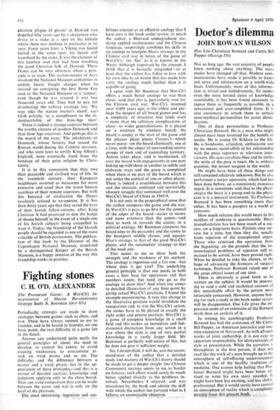Fighting stones
C. IL O'D. ALEXANDER
The Protracted Game: A Wei-Ch'i In- terpretation of Maoist Revolutionary Strategy Scott A. Boorman (our 65s)
Periodically attempts are made to draw analogies between games, such as chess, and war. These have always seemed to me to founder, and to be bound to founder, on one basic point; the real difficulty in a game lies in the detail.
Anyone can understand quite easily the general principles of chess; the need to develop, to control the centre, to avoid creating weaknesses, to concentrate at- tack on weak points and so on. The difficulty, and the difference between a master and a weak player, lies in the ap- preciation of these principlesr,and this is a matter of -detailed analysis, knowledge and judgment applying only to the chess board. Thus any valid comparison that can be made between the game and war is only on the level of the platitude.
The most interesting, ingenious and am-
. v,
bitious attempt at an effective analogy that I have seen is the book under review, in which the author, a Harvard undergraduate stu-
dying applied mathematics and the Chinese language, surprisingly combines his skills in an attempt to interpret Mao's strategy in the Chinese civil war in terms of the game of Wei-Ch'i : (or `Go' as it is known in the West). Although impressed by the attempt, I think that it is basically misguided—or at least that the author has fallen in love with his own idea to an extent that has made him carry the analogy much further than it is capable of going.
I agree with Mr Boorman that Wei-Ch'i offers a much better analogy to war than chess—and that this is particularly true for the Chinese civil war. Wei-Ch'i, invented over 4,000 years ago, is the oldest and per- haps the deepest of all board games and has a simplicity of structure that lends itself —more than the arbitrary complications of chess—to wider generalisations. It is played on a nineteen by nineteen board; the board is empty at the start of the game and the players place pieces (`stones')—which never move—on the board alternately, one at a time, with the object of surrounding enemy groups of men and of controlling territory. Action takes place, and is maintained, all over the board with engagements in one part linking up with those in another in subtle and elaborate ways and the game is completed when there is no part of the board which is not under the control of one or other player. There is indeed a resemblance between this and the intricate, confused and territorially obscure struggle that continued well over the Wei-Ch'i board of China in 1945-9.
It is not only in the geographical sense that the author compares the game and the war. In Wei-Ch'i it pays to go first for the control of the edges of the board—easier to secure and more extensive than the centre—and then to work in towards the centre; in a political analogy, Mr Boorman compares the board edge to the peasantry and the centre to the bourgeois middle classes, and equates Mao's strategy to that of the good Wei-Ch'i player, and the nationalists' strategy to that of the weak one.
This seems to me to show both the strength and the weakness of his method. The analogy is ingenious and a fair one—but where does it get you?• The underlying general principle is that one needs in both cases a firm base for operations and that numbers count; but need one go to the analogy to show this? And when one comes to detailed illustration of any finer point by giving actual Wei-Ch'i positions, I found the example unconvincing. A very tiny change in the illustrative position would invalidate the comparison and, to win the Wei-Ch'i action, the stones have to be played in exactly the right order and precise position; Wei-Ch'i is a game of complete knowledge in a small field and this makes an immediate and fun- damental distinction from any action in a war where the state is one of very partial knowledge in a vastly larger field. Mr Boorman is perfectly well aware of this, but he does not give it sufficient weight.
No, I do not think it will do, and the recom- mendation of the author that a detailed study and mastery of Wei-Ch'i theory should be made to get a deeper insight into Chinese Communist strategy seems to me to border on fantasy; such effort would surely be much better applied directly to the problems in- volved. Nevertheless I enjoyed, and was stimulated by, the book and admire the skill with which the author has pursued what is, I be'ieve, an unattainable objective.


































 Previous page
Previous page